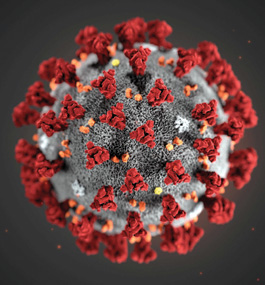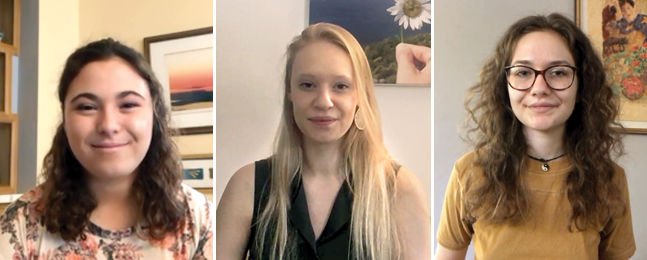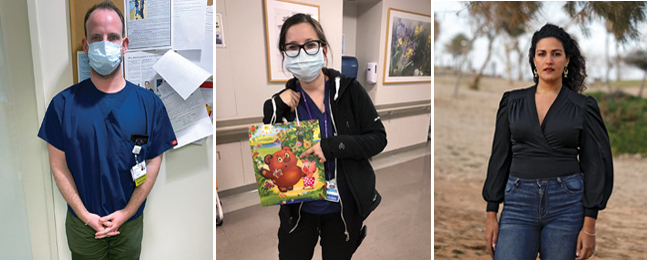Brandeis Responds to the Coronavirus Pandemic
From every direction, the university community is combating the COVID-19 crisis.

Centers for Disease Control and Prevention
In mid-March, Brandeis joined universities across the U.S. and around the world, and dramatically reduced
operations in response to the coronavirus pandemic.
More than 2,400 Brandeis students vacated their dorms. Science labs closed. In a matter of days, professors began to teach more than 1,000 classes remotely, via Zoom or some other videoconferencing platform. Only a few hundred students remained on campus — mostly international students unable to return to their home country, along with other students who, for a variety of reasons, could not continue their studies remotely.
Meanwhile, Massachusetts Gov. Charlie Baker ordered all nonessential businesses to close by March 24.
In mid-April, as the state remained in lockdown, on-campus Commencement ceremonies for the Brandeis Class of 2020 were postponed until 2021.
Instead, faculty, staff, students and alumni self-recorded their well wishes as part of a video shared with graduates and their families on May 24. In a separate prerecorded video, degrees were conferred by President Ron Liebowitz; Provost Lisa Lynch; Dorothy Hodgson, dean of the School of Arts and Sciences; and Meyer Koplow ’72, P’02, P’05, chair of the university’s Board of Trustees. Lewis Brooks ’80, P’16, president of the Alumni Association, inducted the graduates as alumni.
Throughout late May and early June, many academic departments scheduled virtual mini-celebrations to honor their graduates.
Although coronavirus upended the usual pomp and circumstance of Commencement, Brandeis still gave honorary degrees to former Knesset member Ruth Calderon, a scholar of Jewish religious texts; retired Hasbro CEO and philanthropist Alan Hassenfeld, co-chair of the Brandeis International Business School board of advisers; television producer Marta Kauffman ’78, creator of the iconic series “Friends” and, more recently, “Grace and Frankie”; and painter and mixed-media artist Howardena Pindell.
“All our honorary degree recipients have distinguished themselves through perseverance, resilience and the ability to adapt with changing times,” said Liebowitz. “These are all characteristics shared by our impressive Class of 2020, which has performed outstanding work this spring under extraordinary conditions.”
If resilience and flexibility were the watchwords of the spring semester, the goal was mitigating the calamity’s effects.
Brandeis initially responded to the emerging economic crisis by freezing salary increases, reducing capital and operating expenditures, and significantly slowing hiring. Liebowitz and the senior leadership team took a 10% pay cut that will extend through the end of 2020; the president’s salary was later reduced by an additional 10%. In early May, Liebowitz asked senior administrators to cut operating budgets by 10% across the university and warned that additional savings, up to 20%, might be requested in the fall semester.
“While I hope that the mitigating measures we’ve taken will be sufficient, it is possible we will need to do more,” Liebowitz wrote in a May 1 community message. Meanwhile, Brandeis provided emergency paid time off through June 30 for employees who were able to work but didn’t have a job assignment.
The university anticipated losing more than $12 million by June 30, the end of the fiscal year, due to the pandemic. More than half of the losses stemmed from reimbursing students for unused room and board fees. In his May 1 message, Liebowitz said he expected “fundraising that directly affects the operating budget to miss its projected target by another $2 million.” The university also lost revenue from canceled events scheduled with external groups.
“The coronavirus pandemic continues to challenge us daily in our personal and professional lives,” Liebowitz wrote. “During the past six weeks, the Brandeis community has responded to the unique set of circumstances brought on by the pandemic with compassion, thoughtfulness and ingenuity. This is the spirit and character of Brandeis and reflects the strong sense of community that has characterized the university since its founding.”
In ways large and small, from professors and students reaching out to check in with one another, to collaborating on finding a COVID-19 treatment or cure, to working to protect the most vulnerable among us, Brandeisians around the globe proved Liebowitz correct.
The university gives back
In March, when scientists learned local health-care centers were running low on personal protective equipment, they scoured their storage closets for supplies to donate. Staff at the Rose Art Museum and the Goldman-Schwartz Fine Arts Studios, and members of the Department of Theater Arts also contributed.
All told, the university donated 600 surgical masks, 358 N95 masks, 460 boxes of gloves, and 107 gowns and pairs of booties to local hospitals, health clinics and the Massachusetts Department of Public Health.
Sodexo, the university’s meal provider, began using Usdan’s cooking facilities to prepare thousands of meals weekly for health-care professionals in nearby hospitals.

Simona Shuman ’22, Lauren Davis ’23 and Shai Dinnar ’20
page 2 of 3
In China, a group of parents who’d seen the virus decimate parts of their country raised roughly $30,000, which they used to purchase masks for Massachusetts General Hospital. On each of the 60 donated boxes, the parents affixed a label that read “Innermost Truth Is Love.”
Many students couldn’t afford the cost of getting home in mid-March. Others needed help covering rent, paying utilities or getting internet service. Some students had to pay medical bills. By late May, thanks to donations from students, alumni and staff, the Student Emergency Grant Fund, supplemented by other operational funds, had distributed approximately $575,000, helping nearly 900 students pay for a variety of unexpected costs.
Students fight with compassion and creativity
Sociology major Simona Shuman ’22 is working with sociology professor Wendy Cadge on the Chaplaincy Innovation Lab, which supports research and teaching about spiritual care in a range of settings. “When I see the messages we receive on Facebook and Twitter from chaplains who need help or are just reaching out to say thank you, I see what an impact our work truly makes,” she says.
Lauren Davis ’23 co-founded the Quaranteen Collection, a website dedicated to giving young adults a chance to share their quarantine experiences to, according to the site’s mission statement, “foster empathy, community and empowerment.”
Shai Dinnar ’20, who majored in neuroscience and minored in business, was among the winners in the Beat the Pandemic event that was part of the MIT COVID-19 Challenge, a two-day virtual hackathon held in April. Her team developed a web-based platform called Distance Domestic Violence, to connect individuals impacted by domestic violence with local community-based services.
Alumni join the front lines
Across the world, scores of Brandeis graduates joined the COVID-19 fight as health-care workers, first responders, scientists, policymakers and community activists.
Julia Blanter ’13, Erik Blutinger ’09, Cheryl Schreiber Lewison ’85, Eugene Vortsman ’08 and Hannah Zeltzer ’12 were doctors on the front lines in New York City, risking their health to treat COVID-19 patients.
An internal medicine resident at Boston Medical Center, Ihsan Kaadan, Heller MS’16, worked 12-hour shifts, six days a week, to treat people with coronavirus. It was not the first time he’d worked in a crisis. He completed his first year of residency at Aleppo University Hospital in 2012, amid the chaos in Syria.
“Mentally and physically I was already prepared,” he says. “I didn’t feel like this was completely unknown to me.”
Jonathan Goldman ’19 co-founded the Waltham Mutual Aid Network, a grassroots effort that connects people affected by the pandemic with people and resources that can help. The network has helped redistribute thousands of dollars, purchased and delivered groceries and medicine to those in need, and brought together more than 150 people who want to help their neighbors.
When Israeli comedian and peace activist Noam Shuster-Eliassi ’11 contracted the coronavirus, she convalesced at the Dan Jerusalem Hotel, one of several hotels appropriated to give Israelis a safe place to quarantine. Shuster-Eliassi performed stand-up shows in the lobby to lift the spirits of her fellow patients, who were young and old, Mizrahi and Ashkenazi, Palestinian and Jewish. “I don’t know what this is, but we’re all getting along and I’m having the biggest identity crisis of my life,” she joked to a reporter.
When Shuster-Eliassi was able to return home after receiving two negative coronavirus tests, she said it felt like “leaving a family.”
In isolation, connecting remotely
Although many Brandeis professors had taught remotely before, the scale of the effort to teach effectively during the pandemic was unprecedented.
“We were in uncharted waters,” says Alain Lempereur, the Alan B. Slifka Professor of Coexistence and Conflict at Heller. “We needed to invent a new way of connecting to each other.”
Faculty improvised to pioneer new pedagogical methods. They sent students into Zoom breakout rooms to conduct small-group discussions, used Google Forms to test students’ grasp of readings and lectures, and scheduled one-on-one video conversations.
Many redesigned their assignments and tests. Kene Piasta, PhD’11, an assistant professor of biology, knew his biostatistics students would now have access to the internet and books. So he replaced a traditional exam with a tougher assignment: Students had to write and take their own exam. He judged submissions on the complexity and difficulty of both the questions and the answers.
For her advanced cell-biology class, associate professor of biology Avital Rodal developed a COVID-19 lecture that included advice on communicating science to a lay audience. Then, as part of a test, she asked students to explain a possible treatment for COVID-19 using language a nonscientist could understand.

Eugene Vortsman ’08, Julia Blanter ’13 and Noam Shuster-Eliassi ’11
page 3 of 3
Typically, Jennifer Cleary, a senior lecturer in theater arts, asks students in her public-speaking course to deliver an eight-minute persuasive speech in front of the class. To deal with the switch to remote learning, she asked the students to prepare video recordings of their presentations and share them online. Students needed to figure out how to handle their own lighting, design a backdrop and integrate a PowerPoint presentation into their talk. “Learning to present yourself on video is a very important skill, too,” Cleary says.
Many faculty also quickly realized they had to be more than just teachers. They had to provide support and guidance to students who were worried about their health or felt isolated.
As part of her regular check-in with students, associate professor of psychology Ellen Wright set up a Google Form with questions like “Anything big going on that I should know about?” and “Is there anything I can do to help make life/things better for you?”
When senior lecturer Brenda Anderson, who teaches at both the Heller School and Brandeis International Business School, got the sense her managerial accounting students were missing campus life, she decided community-building exercises were in order. She asked students to share photos of their home workspaces. Later, she requested images of food and recipes her students were cooking at home, which she compiled into a PowerPoint presentation titled “Presenting the Finer Culinary Talents of Our Managerial Accounting Experts!”
Faculty pivot to COVID-19 research
Around the globe, an unprecedented scientific collaboration to understand and combat the virus got underway, moving with astonishing speed and producing important findings.
Brandeis faculty have been part of this vital effort.
Nobel laureate Michael Rosbash, the Peter Gruber Endowed Chair in Neuroscience, is engaged in a Manhattan Project-style effort to fight COVID-19 — a group of 12 of the world’s most prominent scientists, backed by a handful of business titans and billionaires. Officially known as Scientists to Stop COVID-19, the group was formed in March. A month later, group members completed a report that lays out a program for treating COVID-19 patients in the short term, safely reopening the economy and developing a vaccine.
Assistant professor of biochemistry Tijana Ivanovic has long studied such deadly pathogens as influenza and Ebola. In March, she and her lab turned their attention to COVID-19. She worked with Boston University’s National Emerging Infectious Diseases Laboratories to study how the virus penetrates a cell’s membrane.
Computer science professor Pengyu Hong and Hongfu Liu, assistant professor of computer science, used machine learning and artificial intelligence to analyze the genomes of COVID-19, other relevant coronaviruses, avian-influenza viruses and Ebola. Their hope was to tease out the bits of COVID-19’s genetic code that give rise to the virus’s most unique and lethal characteristics.
Artificial intelligence was also brought to bear on coronavirus research by James Pustejovsky, the TJX Feldberg Professor of Computer Science. He and his team created a platform called Semantic Visualization of Scientific Data — aka SemViz — which can sort through the growing mass of published work on coronavirus and help biologists who study the disease notice patterns and trends across research that could lead to a treatment or a cure.
“It is essentially a computer-based ‘reading machine’ that interprets tens of thousands of research articles on coronavirus and presents the results of this process to biologists in a form that is visually accessible, and easily analyzed and interpreted,” Pustejovsky says.
Before coming to Brandeis International Business School in 2019, associate professor of finance Anna Scherbina worked for two years as a senior economist at the U.S. Council of Economic Advisers. So it came as a surprise when, in March, she published a paper on the American Enterprise Institute website that contradicted what the Trump administration was saying at the time about when the economy should reopen.
In her study, which she updated in April, Scherbina compared the economic cost of keeping businesses closed versus the economic benefits of a lockdown that prevents people from getting sick and dying. Her finding? The economy would be hurt more than helped if the economy were restarted before mid-June.
She also determined that, even after the lockdown is lifted, moderate measures such as wearing face masks and limiting public gatherings must be kept in place until a vaccine or an effective treatment is widely available.
In an interview with BrandeisNOW, Hadi Kahalzadeh, a PhD fellow at Heller and the Crown Center for Middle East Studies, talked about the pandemic’s dire impact in another part of the world, Iran. “Because of the financial crisis, the Iranian government cannot protect its population against the coronavirus,” he said. “It’s a very grave situation.”
The university plans for an uncertain future
If the COVID-19 threat forced Brandeis to suddenly and dramatically cut operations in March, it will also compel the university to scale up slowly. Exactly how and when the university does this will be informed by public health guidelines.
Liebowitz expects to announce in early July what the fall semester will look like. Brandeis is planning for a variety of scenarios, including a hybrid option that includes both in-person and remote teaching and learning.
Many factors will come into play as the campus scales up, including visa delays that prevent international students from coming to campus, immunocompromised students or faculty who can’t actually be in a classroom and restrictions on the number of people allowed in a classroom.
“I think what we’re going to see in the fall is more courses [going] up online in an asynchronous way — basic lecture material — and using the in-person or ‘in-person in Zoom-land’ moments for smaller group projects and more detailed, closer interactions between the faculty member and students,” Lynch said in a May 7 live-streamed community check-in.
Lynch calls this hybrid learning approach “flipped classrooms.” She explained what the term means: “We’re flipping [our use of] technology to be able to have that person-to-person connection in two dimensions, as opposed to three, but still reinforcing our commitment to a high-touch faculty-to-student interaction.”
